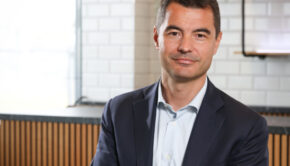Refreshing honesty

In an interview with broadcaster and journalist Chris Donoghue at Ibec’s annual lecture held late last year, Coca-Cola’s Irial Finan discussed his experiences with one of the world’s most recognisable and influential brands. Gillian Hamill reports on the business insights he had to share
19 February 2016
“Don’t become risk averse on people,” urges Irial Finan. A nugget of advice the Roscommon native is well-placed to give. After all, if no-one had taken a risk on him, he would not have reached his current position of executive vice-president of the Coca-Cola Company and president of Bottling Investments Group (BIG).
The top brass Coca-Cola exec explained how he achieved his rapid career trajectory at Ibec’s annual lecture held in December in the organisation’s Dublin HQ. Counting Trust House Forte and Bord na Móna among his former employers, the day Irial started to sit his final exams in chartered accountancy, he handed in his notice at Bord na Móna. Fortuitously for him, when finishing up his last lectures at the College of Commerce in Rathmines, “purely by accident”, he “ended up talking to the then CFO of Coca-Cola in Dublin”. Luckily, he recalls: “They were looking for a trainee accountant and I was looking for a job and we got on and I got a job. I guess the rest is history.”
Lessons learnt in north
 His first general management position in Northern Ireland was, he says, “interesting. I knew it was interesting because no-one ever came to visit me!” Reflecting on the lessons learnt from this time, he notes: “The thing that strikes me most today when I look at it; I was 29/30 years of age at the time and somebody took a risk on me. I still reflect back and say, ‘why, did I get the chance to go on and become general manager?’ Obviously I demonstrated some interest or aptitude and so forth, but somebody took a risk nevertheless.
His first general management position in Northern Ireland was, he says, “interesting. I knew it was interesting because no-one ever came to visit me!” Reflecting on the lessons learnt from this time, he notes: “The thing that strikes me most today when I look at it; I was 29/30 years of age at the time and somebody took a risk on me. I still reflect back and say, ‘why, did I get the chance to go on and become general manager?’ Obviously I demonstrated some interest or aptitude and so forth, but somebody took a risk nevertheless.
“What I would say to all of us is don’t become risk averse on people,” he continues. “I think too often we find reasons why not to put people in positions rather than taking a risk and putting them into roles. Certainly I was the beneficiary of that and I was the beneficiary of it many times after that because I rose relatively quickly in the system and moved into Eastern Europe and then took over running Coca-Cola Hellenic.”
Irial’s experiences in Northern Ireland helped demonstrated the importance of having a strong awareness of the internal political situations operating within each marketplace. A vital consideration given that the corporate mammoth that is Coca-Cola operates in numerous countries.
Cultural awareness
“When I went to Northern Ireland, I was pretty naïve,” Irial admits. “Probably in hindsight, if I knew what I knew a year later, I mightn’t have gone.” That said, he adds: “Actually I loved it, Belfast is a great city and I loved living there.” To explain his trepidation, he relates a “small story to best describe how I started to understand some of the dynamics…They have fair employment legislation in Northern Ireland and basically in the form you fill out, you had to say whether you were a Catholic or Protestant. I didn’t know this; I was three months in and somehow or other I found out about this, because you had to report on the number of Catholics and Protestants you had in terms of localities and so forth.” Unbeknownst to him, “after a lot on shuffling going on,” a colleague revealed that, “we needed a catholic so we put you down as a catholic.” Irial’s response was a classic. “I said, ‘Do you know I’m a Jew?’ and they looked at me and said we didn’t but anyway there’s no place on the form for that.”
Irial jokes that “a Catholic and a Jew are close enough!” but his more earnest reflection on the matter is that it formed “an early induction into understanding what drives certain behavior and how people think and act. And I think I’ve always brought with me a deep sense of really trying to understand what is happening in each country.”
He has since applied this insight in a practical fashion many times over throughout his career. “When we moved to the US, firstly I got a couple of professors from the local university to come and talk to me about the US,” he says. “Because I had the impression this is great, everybody is straight, if you want to fire someone you just tell them. Certainly when you’re down south it doesn’t work like that, you had to do three or four different iterations to tell [someone] they’re not performing.” This type of cultural knowledge is essential in order to avoid making a serious faux-pas, according to Irial. “You have to learn those things and you have to be attuned into understanding culture,” he says. “Once you understand that then I think you can operate much more effectively in any given market but it takes time; experience does help.”
Irish roots
With 34 years within what he describes as “the Coca-Cola system” (at the Coca-Cola Company for 11 years and the bottling system prior to that), Irial has certainly amassed plenty of experience. As interviewer Chris Donoghue points out, Coca-Cola is “a massive company” with 94% of the world’s population recognizing the red and white of the classical brand and 1.9 billion servings of Coca-Cola being poured out across the globe every day. Subsequently, this high-achiever’s genuine Irish origins make him stand out. As Chris puts it: “It’s not that your granny was Irish or your granny’s Redsetter was Irish, but you went to primary school, secondary school and third level education all in Ireland. Were your parents the type of people that prepared their children for a global giant?”
“I guess my parents were ahead of their time,” Irial replies. “My father was a small builder and in those days in Roscommon, he was an avid Fine Gael supporter in a county which was always dominated by Fianna Fáil which led to some interesting discussions at home. My mother was much smarter,” he grins, to much general merriment among the audience. “She figured out early on that education really was what mattered. She insisted that all eight of us went to proper high school and to university so all of my brothers and sisters went to university and all did pretty well, but it’s anchored back largely to my mum.”
Importance of education
Indeed, his mother had experienced the benefits of education first-hand. “She had gone to secondary school and in those days it was not that common for a woman to have gone through secondary school,” Irial says. “She was a great believer in education, a great believer that that differentiated and gave an opportunity.
“There was no limit I’d say to either my mother or father’s ambitions,” he adds. “They just wanted to see us be well educated and try to become the best that we could, and if that meant going overseas, it meant going overseas. They didn’t have any constraints on what you could or couldn’t do. And actually as it happened most of my family went overseas, or at least a good chunk of them did. Many of them have come back, but that’s just the way we grew up and how we operated in those days.”
A lot of air miles
Travelling overseas has since become an aspect of his job with which Irial is extremely familiar, given that he has multiple countries to visit across the globe, or as Donoghue says, “a lot of time zones and air miles”. Irial has no complaints about his demanding schedule though, as he believes it’s important to make physical contact with the different markets. “I guess that goes back to understanding who we are and what we are,” says the executive VP. “We talk about the Coca-Cola Company and the Coca-Cola system and the Coca-Cola Company is essentially concentrated on the marketing side and we’ve got the bottling side and when you add the two together, you’ve got a business of around $20 billion+ so nobody ever sees the true, consolidating revenue for the system. We also have about 800,000 employees so I could say we’re a service business and our business is about people as much as anything.”
In BIG alone, there are around 150,000 people; a number which Donoghue points out is “twice the population of Roscommon!” But Irial remains resolute, stating: “If you don’t touch people, if they don’t see the leadership, if they don’t understand what your strategies are, you’re missing out massively in terms of how you can drive your business. I believe passionately in engaging regularly with our people and making sure we’re absolutely on the same page in terms of our strategies.”
As well as the US, the executive VP spends a lot of time in China, Germany, South East Asia, Vietnam and Malaysia. He is also on the boards of many of Coca-Cola’s major bottling companies around the world so whether that is in Western Europe, the Middle East or Latin America, he says “you get a pretty deep engagement across all the [regions]”.
Crisis management
As one would expect with such a high-ranking figure, crisis management is a pertinent topic. To illustrate how he deals with a crisis, Irial reflected on how he coped during the Russian currency devaluation in 1998. “My boss at the time was a man called Andrew David, a fascinating man, a Greek Cypriot,” he recalls. “Andrew was educated in Trinity so he had a great affinity for Ireland and the first bottling business they bought was in Ireland actually. When Andrew thought about issues and problems, for him they were very simple. If there was a problem and you knew about it, [he would say] what have you done? If the problem was outside your control, forget about it.”
A wise policy according to Irial who enthuses: “Nobody in this room can impact the currency, all you can do is, if you know you’re going to have a revaluation, [look at] what decisions you can make to try and protect yourself against it and if you haven’t [done that] and you know it’s going to happen, then shame on you.”
It would therefore appear that Irial has honed a clear-cut approach to managing a crisis, but perhaps surprisingly, believes that “managing success is very often more difficult than managing adversity”. Elucidating on this statement, he says: “When you’re managing adversity, pretty often you’re absolutely focused on taking cost out, and in some ways that’s easier. When you’re growing, you’ve got all kinds of decisions that you have to make and you’re making investments and adding more operating cost because you want to harvest when the going is good. But the decisions you make [can] add an awful lot of fixed cost into your business. Simplistically as I look at it, within Ireland plc, I hope particularly at a government level, that we don’t start adding an awful lot of fixed cost. We don’t end up putting a massive burden back on the people. We should manage prudently through the good times.”
Tackling obesity
Speaking of prudent management, a brave audience member decided to tackle what he described as “the elephant in the room” – and asked Irial about rising obesity levels. He responded with several points, the main one being that we should “have an open and transparent debate”. He also pointed out that many of the colas sold by the company today are either low or no calorie so “the amount of sugar we’re selling [has] reduced over the last 10 years”. A hypothetical ban on carbonated beverages alone would not be fair in Irial’s view, as “you can’t say there’s good sugar or bad sugar…We should be honest with ourselves and say we [will] find other solutions because our lifestyle has changed. We don’t move as much. [The issue] is about people taking in too many calories; I think we have to collectively try and find a solution. Be under no illusion, we do understand we have a role to play. We’re not walking away from it; we’re trying to be a good corporate citizen. That’s why we’ve done the bike schemes here in Ireland, it’s part of giving back. If that helps in some small way, I think I can sit in front of you and say, do you know what, we are trying to do something.”



 Print
Print



Fans 0
Followers